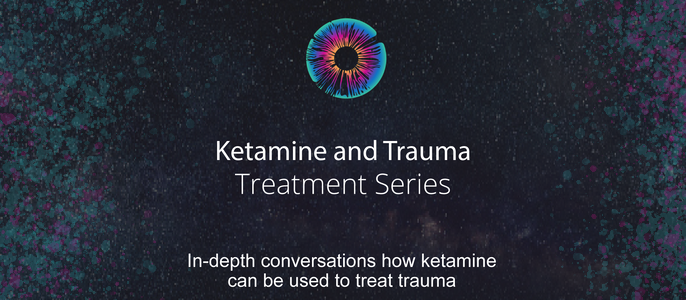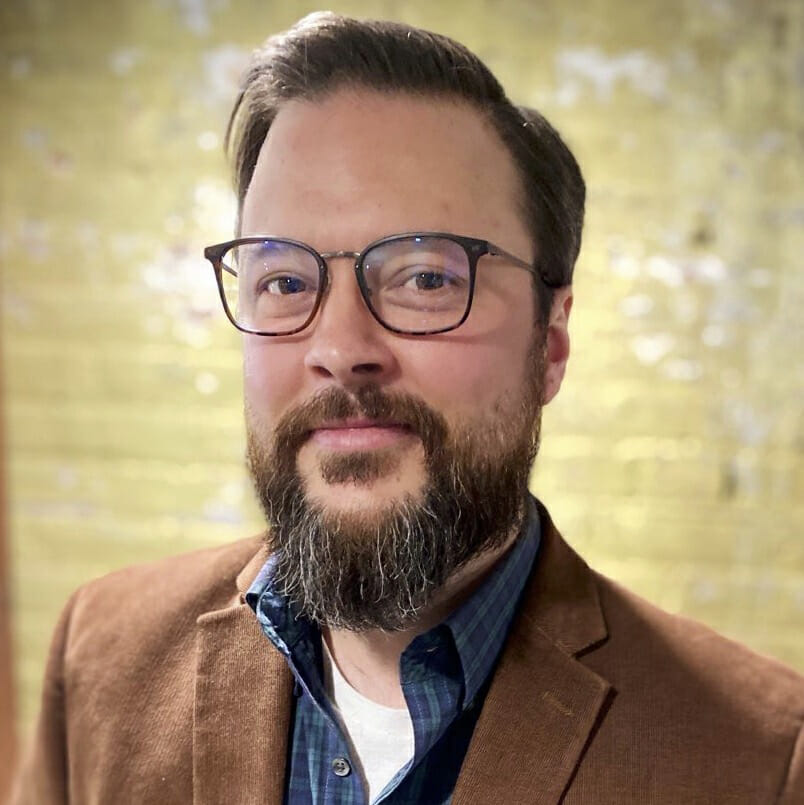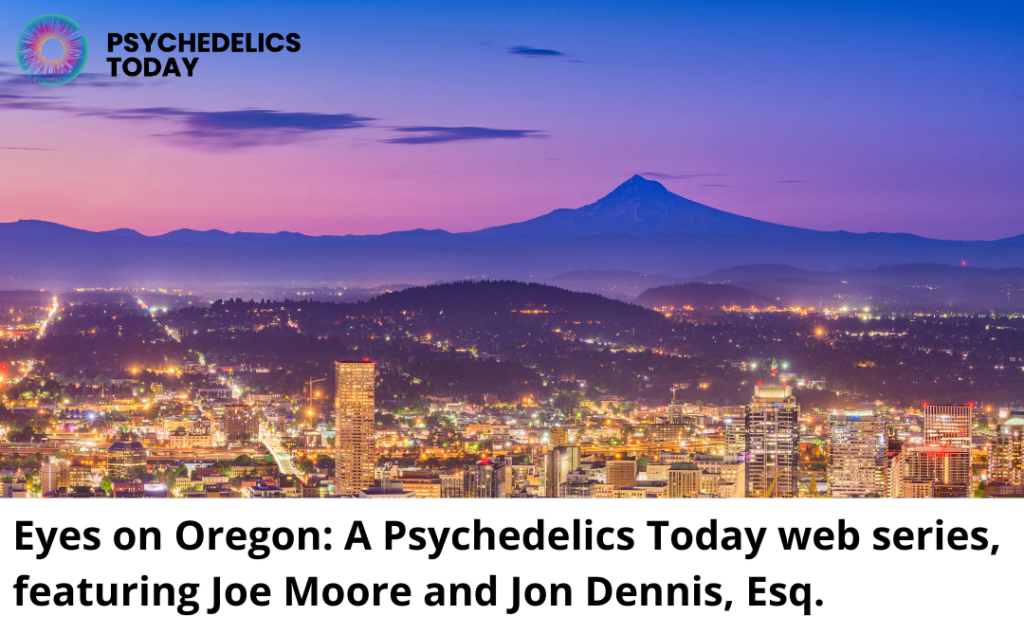By Jon Dennis, Esq. and the Psychedelics Today team
On the eve before the final vote, Jon Dennis, Esq. shares his thoughts.
If you don’t know Jon Dennis yet, he’s an activist and attorney leading the charge for affordable community access and religious freedom under Oregon’s Measure 109 program, as well as the co-host of our Eyes on Oregon series. He’s been involved in many of the official Oregon Health Authority (OHA) Subcommittee meetings and has been keeping us up to date with everything going on in Oregon.
Last week, Jon shared an update on the effort for religious freedom and community access that included official public comments from David Bronner, the Psychedelics Bar Association’s Religious Use Committee, Dr. William Richards of Johns Hopkins, and the Entheogenic Practitioners Council of Oregon. While not our typical blog content, we felt it was important to highlight these statements because they so passionately display how important this is to so many Oregonians and others across the United States – and because rulemakers may be reading.
This week is the week many in the psychedelic community have been working toward and excitedly anticipating, as Wednesday, May 25th is the day the Oregon Psilocybin Advisory Board (OPAB) will make its final vote on whether to recommend allowing a community-use paradigm of psilocybin services that Jon and so many others have been advocating for.
To hopefully bring even more attention to this landmark event, we thought it’d be helpful to share the comment Jon sent to the OHA, as it perfectly summarizes why his proposed entheogenic practitioners framework is so important.
We invite Oregon rulemakers to read Jon’s succinct overview of the issues in advance of their Wednesday vote.
“There is a growing social movement that believes access to psychedelics is a fundamental civil and human right that should be denied to no person. Members of this movement consider psychedelic freedom to be the maligned cousin of religious freedom. For some people, they are the same or very closely intertwined.
Pew Research data show that only 49% of people report ever having had a mystical experience in their entire lives, which is defined as a “moment of sudden religious insight or awakening.” Also, 49% of respondents to your Community Interest Survey on psilocybin under M109 said they were interested in psilocybin for spiritual reasons.
The fastest growing category of religious self-identification in the United States is people who identify as “spiritual but not religious.” For a growing number of people in our society, religious institutions have come to be viewed with distrust, often because they have inflicted religious trauma on people who’ve come in search of healing. When I began talking about the proposed religious use framework under M109, I was initially amazed at the amount of criticism I got on account of it protecting “religions.” People liked the community access model, but they thought they wouldn’t benefit from it because “religion” for them has become obsolete.
I believe, as many do, that we are undergoing a spiritual crisis. Martin Luther King warned that a society that is addicted to war and ignores its problems of racism and poverty “is approaching spiritual death.” There is growing recognition that we have the analytical and technical solutions required to solve many of the world’s greatest problems but lack the social and political will. King recommended that we become less of a “thing-oriented society” and more of a “person-oriented society.”
I see these problems as spiritual in nature and believe they might be solvable only through spiritual solutions.
Oregon is about to begin a great experiment of introducing legal adult-use psychedelics into mainstream Western society through its safe and legal container of Measure 109. So far as I can tell, nearly everyone who works with psilocybin or other psychedelics in a sincere and personal manner believes that psychedelics have the potential to help us breathe some much-needed spiritual life into society. We believe adoption of an affordable community-access model of psilocybin services to be a moral imperative.
An expensive program in Oregon creates a new kind of religious or spiritual inequity that I don’t think we are capable of fully comprehending yet, but it clearly exacerbates other types of social problems that already plague us.
“Affordable access for all people” doesn’t mean that everyone should take psychedelics. I view the question of whether to take psychedelics as a big decision that should be made only after careful consideration of a number of things. One of the best promises of the M109 system, from my perspective, is that people will be required to consider some of these things before they make potentially life-altering decisions, and that people can agree to purchase these potentially-profound and potentially-destabilizing psilocybin experiences only after giving informed consent. The other great M109 promises: Support is available before, during, and after the experience; there will be a lot more oversight and accountability; a lot more access to medical and legal assistance; and people won’t really have to fear going to jail. This framework is a light-years-leap forward in terms of the safeguards of the so-called “unregulated market.” It really is quite brilliant.
Within the M109 framework, the harms that could be caused by untested, community-grown mushrooms would be practically non-existent in the context of sincere community use and cannot be used as an honest justification for rules that would effectively require communities who work with psilocybin to procure their community sacrament through commercial channels. When regulations drive up costs without serving important government interests, they raise paywalls, deepen inequities, and further racial, gender, class, and other divides.
Affordable, community-grown mushrooms would decrease paywalls and, contrary to the position announced in your Fiscal and Economic Impact Statement, actually drive more of the unregulated market into the safety of the M109 container. More people will take psilocybin under M109 if its costs are considered by consumers to be justifiable when compared with the unregulated market.
Moreover, many religious and spiritual communities who work with psilocybin report having a relationship with the living psilocybin organism that can only be described as sacred. Under federal jurisprudence, religious freedom laws require a “compelling government interest” in order for the government to have any say on how a religious community grows, handles, stores, consumes, or discards their psychedelic sacraments. And (assuming arguendo that the government might have a compelling interest here), any time a government deigns to enforce laws that burden free religious exercise, under federal jurisprudence, it must still tread carefully and impair religious freedom only by “the least restrictive means” of doing so.

Sincere religious communities are publicly saying that they intend to operate under Measure 109, and it is only right that the State consider the regulation of these organizations in light of the broad federal protections that now exist under the Religious Freedom Restoration Act – and which were, in fact, enacted in reaction to Oregon’s allowing members of the Native American Church to be fired for practicing their religion, which uses peyote.
Oregon isn’t a state that generally tries to short-change people on civil liberties issues.
The ask here is that you permit Oregonians to take and use the non-Western medicine in ways that reflect non-Western paradigms of health and wellness. The truth is: potency-testing is part of a Western paradigm, and psilocybin has always been a non-Western medicine. It is exciting to witness the power of psilocybin beginning to be harnessed by skillful Western medical practitioners, but Western practitioners are relatively new to the psilocybin and the psychedelic scene. It is appropriate for us Westerners to defer to Indigenous voices when their experience surpasses our own, and to incorporate their wisdom and experience into our “Oregon Model.” I believe we can do this if only we make sure these psilocybin regulations aren’t too rigid or too heavy handed.
The entheogenic practitioner framework and manufacturing endorsement work together to do two things:
- Honor the religious liberties of sincere religious practitioners who work with psilocybin; and
- Create an affordable community-access model and community container for psilocybin services.
A one-size-fits-all system would treat churches and other community-owned nonprofit organizations the same way as luxury resorts. This is out of touch with federal religious freedom laws and raises unnecessary paywalls for 520,000 Oregonians who live in poverty.
I hope you will consider these things when you decide how to balance safety and access.
Yours in service,
Jon Dennis”
Stay tuned for updates and analysis after Wednesday’s vote, as the coming weeks will bring forth a revamped Eyes on Oregon podcast, as well as a new series exploring Oregon’s emerging psychedelic marketplace through the lens of lawyers.
About the Author

Jon Dennis, Esq. is a principal and consultant with Psychedelics Now and an Oregon lawyer. He is the co-host of a Psychedelics Today podcast series called Eyes on Oregon, which follows the developments in Oregon’s psilocybin rulemaking process. He has a law degree from Lewis & Clark Law School and a BA in Religious Studies from the University of Kansas.











